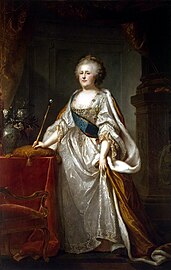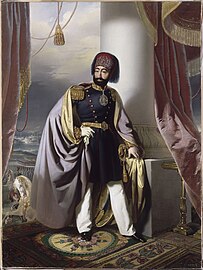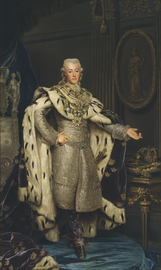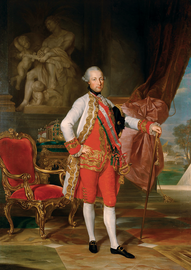Enlightened absolutism
Enlightened absolutism, also called enlightened despotism, refers to the conduct and policies of European absolute monarchs during the 18th and early 19th centuries who were influenced by the ideas of the Enlightenment, espousing them to enhance their power.[1] The concept originated during the Enlightenment period in the 18th and into the early 19th centuries. An enlightened absolutist is a non-democratic or authoritarian leader who exercises their political power based upon the principles of the Enlightenment. Enlightened monarchs distinguished themselves from ordinary rulers by claiming to rule for their subjects' well-being. John Stuart Mill stated that despotism is a legitimate mode of government in dealing with barbarians, provided the end be their improvement.[2]
Enlightened absolutists' beliefs about royal power were typically similar to those of regular despots, both recognizing that they were destined to rule. Enlightened rulers may have played a part in the abolition of serfdom in Europe.[3] The enlightened despotism of Emperor Joseph II of the Holy Roman Empire is summarized as, "Everything for the people, nothing by the people".[4]
History[edit]
Enlightened absolutism is the theme of an essay by Frederick the Great, who ruled Prussia from 1740 to 1786, defending this system of government.[5] When the prominent French Enlightenment philosopher Voltaire fell out of favor in France, he eagerly accepted Frederick's invitation to live at his palace. He believed that an enlightened monarchy was the only real way for society to advance. Frederick was an enthusiast of French ideas. Frederick explained: "My principal occupation is to combat ignorance and prejudice ... to enlighten minds, cultivate morality, and to make people as happy as it suits human nature, and as the means at my disposal permit."[6]
Enlightened absolutists held that royal power emanated not from divine right but from a social contract whereby a despot was entrusted with the power to govern through a social contract in lieu of any other governments. The monarchs of enlightened absolutism strengthened their authority by improving the lives of their subjects. The monarch’s taking responsibility for his subjects precluded their political participation.
The difference between an absolutist and an enlightened absolutist is based on a broad analysis of the degree to which they embraced the Age of Enlightenment. Historians debate the actual implementation of enlightened absolutism. They distinguish between the "enlightenment" of the ruler personally, versus that of his regime. For example, Frederick the Great was tutored in the ideas of the French Enlightenment in his youth, and maintained those ideas in his private life as an adult, but in many ways was unable or unwilling to effect enlightened reforms in practice.[7] Other rulers such as the Marquis of Pombal, prime minister of Portugal, used the ideas and practices of the Enlightenment not only to achieve reforms but also to enhance autocracy, crush opposition, suppress criticism, advance colonial economic exploitation, and consolidate personal control and profit.
The concept of enlightened absolutism was formally described by the German historian Wilhelm Roscher in 1847[8] and remains controversial among scholars.[9]
Centralized control necessitated centralized systematic information on the nation. A major renovation was the collection, use and interpretation of numerical and statistical data, ranging from trade statistics, harvest reports, death notices to population censuses. Starting in the 1760s, officials in France and Germany began increasingly to rely on quantitative data for systematic planning, especially regarding long-term economic growth. It combined the utilitarian agenda of "enlightened absolutism" with the new ideas being developed in economics. In Germany and France, the trend was especially strong in Cameralism and Physiocracy.[10]
Major nations[edit]
Government responses to the Age of Enlightenment varied widely. In several nations with powerful rulers, called "enlightened despots" by historians, leaders of the Enlightenment were welcomed at Court and helped design laws and programs to reform the system, typically to build stronger national states.[11] In France the government was hostile, and the philosophers fought against its censorship. The British government generally ignored the Enlightenment's leaders.
Frederick the Great, who ruled Prussia 1740–1786, was an enthusiast for French ideas (he ridiculed German culture and was unaware of the remarkable advances it was undergoing). Voltaire, who had been imprisoned and maltreated by the French government, was eager to accept Frederick's invitation to live at his palace. Frederick explained, "My principal occupation is to combat ignorance and prejudice ... to enlighten minds, cultivate morality, and to make people as happy as it suits human nature, and as the means at my disposal permit".[12] He wrote an essay on "Benevolent Despotism" defending this system of government.[13]
Empress Catherine II of Russia sponsored the Russian Enlightenment. She incorporated many ideas of Enlightenment philosophers, especially Montesquieu, in her Nakaz, which was intended to revise Russian law. However, inviting the famous French philosopher Denis Diderot to her court worked out poorly.[14]
Charles III, King of Spain from 1759 to 1788, tried to rescue his empire from decay through far-reaching reforms such as weakening the Church and its monasteries, promoting science and university research, facilitating trade and commerce, modernizing agriculture and avoiding wars. The centralization of power in Madrid angered the local nobility, and challenged the traditional autonomy of cities, and so resistance grew steadily. Consequently, Spain relapsed after his death.[15][16]
Emperor Joseph II, ruler of Austria 1780–1790, was over-enthusiastic, announcing so many reforms that had so little support that revolts broke out, and his regime became a comedy of errors.[17]
In some countries the initiative came not from rulers but from senior officials such as the Marquis of Pombal, who was Joseph I of Portugal's Secretary of State.[18] For a brief period in Denmark Johann Friedrich Struensee attempted to govern in terms of Enlightenment principles. After issuing 1,069 decrees in 13 months covering many major reforms, his enemies overthrew him, and he was executed and quartered.[19]
In other cultures[edit]
China[edit]
Xuezhi Guo contrasts the Confucian ideal of a "humane ruler" (renjun) with the ideal of Chinese legalists, who he says "intended to create a truly 'enlightened ruler' (mingjun) who is able to effectively rule the masses and control his bureaucracy"; this ruler would be a "skillful manipulator and successful politician who uses means or 'technique' in achieving self-protection and political control". Guo quotes Benjamin I. Schwartz as describing the features of "a truly Legalist 'enlightened ruler'":[29]












